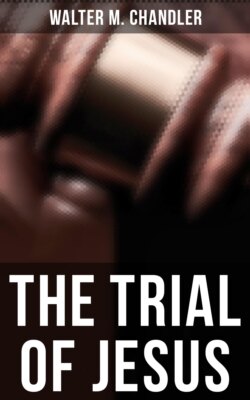Читать книгу The Trial of Jesus - Walter M. Chandler - Страница 15
На сайте Литреса книга снята с продажи.
CHAPTER V HEBREW CRIMINAL LAW—MODE OF TRIAL AND EXECUTION IN CAPITAL CASES
ОглавлениеTable of Contents
THE administration of Hebrew criminal law was marked by lofty conception of right and wrong, and was pervaded by a noble sentiment of justice and humanity. From the framing of the Decalogue to the latest years of Jewish nationality, each succeeding generation witnessed some humane and merciful modification of existing rules. Talmudic interpretation invented a series or collection of sayings that gave form and character to the whole body of later Hebrew law. These maxims were intended to mitigate the rigors of the Mosaic Code and to establish safeguards against negligence or injustice to the defendant in criminal trials. Indeed, every possible precaution was taken to render impossible the wrongful conviction of an accused person. The student of Hebrew law is at times astonished by the excessive caution inculcated in criminal procedure. Certain cautionary rules are no less than pedantic, and may be justly and aptly styled Judaical. The judges leaned always to the side of the defendant and gave him the advantage of every possible doubt. They went a step farther and sought pretext after pretext that would result in an acquittal. A sense of awful responsibility weighed upon the hearts and consciences of the judges. The services of the synagogue were not conducted with deeper fervor or greater religious solemnity than were the proceedings of a capital trial in the great Judgment Hall of the Sanhedrin. Certain sacred maxims flamed forever like beacon lights along the pathway of the members of the court during the solemn deliberations. "A judge," says the Talmud, "should always consider that a sword threatens him from above, and destruction yawns at his feet." The ancient adage, "the pen of the law fears the thunder of Heaven," though of Chinese origin, is Hebraic in spirit. "Thou shalt do no unrighteousness in judgment" was the leading aphorism of Hebrew jurisprudence. Among the earliest traditions of the Fathers, we read this maxim: "When a judge decides not according to truth, he makes the majesty of God to depart from Israel. But if he judges according to the truth, were it only for one hour, it is as if he established the whole world, for it is in judgment that the divine presence in Israel has its habitation." Hebrew horror of capital punishment and dread of taking human life are well expressed in the celebrated maxim of the Mishna: "The Sanhedrin, which so often as once in seven years, condemns a man to death, is a slaughter-house."[164] And more striking and startling still is the terrible sentence of Rabbi Meir: "What doth God say (if one may speak of God after the manner of men) when a malefactor suffers the anguish due to his crime? He says, My head and my limbs are pained. And if he so speaks of the suffering even of the guilty, what must he utter when the righteous is condemned?" The whole spirit of Talmudic caution is well illustrated by the principal rule of the Pirke Aboth, which says: "Be cautious and slow in judgment, send forth many disciples, and make a fence round the law."[165]
In addition to the maxims above mentioned, which were more religious than legal, four cardinal rules of criminal procedure—"strictness in the accusation, publicity in the discussion, full freedom granted to the accused, and assurance against all dangers or errors of testimony"[166]—molded the judgment and guided the consciences of Hebrew judges. These sayings of the Fathers and maxims of the law were the touchstones of all their judicial inquiries and meditations at the trial of capital cases. With prayer in their hearts and these maxims upon their lips, they applied themselves to the solemn duties of their office.
A most interesting passage in the Mishna draws a striking contrast between capital trials and those involving questions of money only. The relevancy of the passage to this chapter is so great that it is deemed best to quote it entire:
